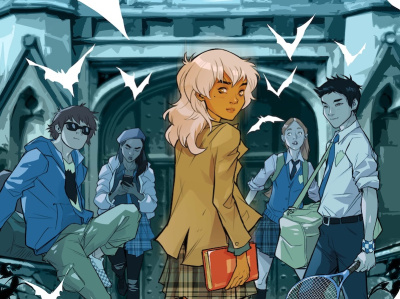
Christopher Handley was sentenced Wednesday to six months in the federal prison system for “possession of obscene visual representations of the sexual abuse of children,” (i.e., manga). The judge asked that the “Defendant be considered for placement at a community correctional facility or if that is not available, placement at a medical security facility so that Defendant’s medical needs can be adequately met.”
The jail time will be followed by three years of supervised release on that count. During the supervised release Handley is to participate in a treatment program to include psychological testing and a polygraph examination.
Handley was sentenced to five years of probation on the “mailing obscene matter” count, which will run concurrently with the supervised release to the degree the sentences overlap.
The sentence also included a $200 forfeiture, and the forfeiture of the manga and the computer used to order them.
The elements above were all agreed to by the defense and the prosecution and presented to the judge as a joint sentencing recommendation (see “Possible Sentencing Deal in Handley Case”).
There was no requirement in the sentence issued by the judge that Handley register as a sex offender, nor was there a requirement in the sentence that he stay away from children.
Three counts were dismissed at the request of the prosecution based on the plea agreement (see “Handley Pleads Guilty”).
The U.S. Attorney described Handley in his sentencing brief in a way that could probably describe many manga fans. “His primary means of social interaction with others has not been involvement in the community, but has been playing online role-playing games,” the brief said of Handley. “Mr. Handley recognizes that these hobbies have been a compulsion, causing him to incur ‘significant debt from buying various Japanese art forms’ and ‘upgrading his computer system.’” The sentencing brief also described the results of a psychological exam of Handley.
The prosecution’s sentencing brief also listed the seven manga that were in the package intercepted by the postal inspector:
-
Book 1) “unfinished school girl” (presented by TAMACHI YUKI) (LE Comics);
-
Book 2) “I ! DOLL” (MAKAFUSIGI presents) (Seraphim Comics);
-
Book 3) “for ESSENTIAL 3" (THE ANIMAL SEX ANTHOLOGY Vol.3) (Izumi Comics);
-
Book 4) “NEKOGEN, Neighboring House Family” (MD Comics);
-
Book 5) ISBN4-89465-172-6 (No English language title found) (Seraphim Comics);
-
Book 6) ISBN4-89465-222-6 (No English language title found) (Seraphim Comics); and
-
Book 7) ISBN4-89465-193-9 (No English language title found) (Seraphim Comics).
The prosecution argued that comics were worthy of the same prosecution as real depictions of sex acts involving children:
“Some may argue that the crime at issue is not serious because no real children were involved. Such a viewpoint is short-sighted because it gives little weight to the nature of obscenity crimes, in general, and to the specific images involved in this case. A picture, proverbially, paints a thousand words, and there is no doubt that comic books, graphic novels, and works of manga and anime have a powerful ability to communicate through their use of dramatic imagery. Since the 1960s, the genre of comic books has been transformed from a target market of younger customers to a broad, word-wide market aimed at older, more mature consumers. The ground-breaking graphic novel, Watchmen, by Alan Moore and Dave Gibbons was even named by Time magazine of one of its top 100 novels of the 20th century. The power of the illustrated story should not be short-changed.”
The prosecution notes, as the defense does in its brief, that there are no analogous cases to use for sentencing guidance because is the first time that comics (or other not-real depictions) have been prosecuted as a federal crime under the new statute.
The defense counsel’s brief noted that no actual pornography was found in Handley’s home or on his computer, and that the lolicon material was “only a minute portion of his entire collection, which consisted of tens of thousands of manga and anime, representing all genres of the art form.”
The defense said that Handley was aware of a recent Supreme Court decision. “He didn’t know that these books were illegal—they were just drawings, after all, and the Supreme Court had recently held a statute outlawing “virtual” child pornography to violate the Constitution, a fact of which Mr. Handley was aware,” the brief said. Handley did not know, however, that Congress had passed another law banning the same materials after that decision, which it deemed more likely to pass constitutional muster. Since this case was pleaded out, we won’t know whether that’s the case until a defendant willing to take the matter to trial is charged.
In addition to the legal and other arguments the defense made in its brief, it also provided a group of character references of Handley. We’ll wrap up our account of this sad day with the final paragraphs of the letter from Michael Snavely, Sr., a friend of Handley’s.
“Regarding this case, I am personally unable to understand the reasoning and justice behind the criminalization of the act of reading a comic book that contains objectionable sexual material. This is especially hard to understand when other more heinous material permeates our society and has not been criminalized.
“Murder, for instance, is glorified and portrayed with real humans in movies. If it is true that a person is likely to commit the crime of child molestation merely because that person has been looking at drawings depicting that act then why is it not a crime to watch movies or look at drawings of murder? Murder is considered a more serious crime, is it not? I fail to see the reasoning behind the criminalization of the lesser and not the more serious.
“It is therefore my opinion that Chris has once again taken responsibility for an act even when the criminality of that act could not have been known to anyone not in the legal profession. How is one to know whether or not a particular drawing is obscene? Who determines what obscene is? The term would surely vary depending on region and religious upbringing of the people attempting to define it.
“I am truly sorry that Chris has been the victim of such a pitiful legal defense and lawmakers attempting to legislate morality. It is my hope that you will also see the injustice of this situation. I fully trust and expect you to carry out your responsibility to ‘we the people’ and do what is right.”
The Comic Book Legal Defense Fund did not provide the defense for Handley, but was a special consultant to Handley’s defense team, providing access to First Amendment experts, recommending expert witnesses on manga, and funding expert research for an eventual jury trial. To donate to the Comic Book Legal Defense Fund, click here.







